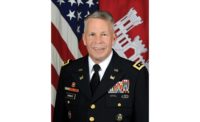With thousands of Afghan evacuees arriving in the U.S. daily in late August as part of Operation Allies Welcome, the federal government was faced with several major logistical questions. To alleviate the backlog of people at Dulles International Airport waiting to be screened or transported to temporary housing, the officials leading Operation Allies Welcome turned to the U.S. Army Corps of Engineers’ Baltimore District.
Just a few weeks earlier, Col. Estee Pinchasin had become that district’s commander, overseeing more than $1.5 billion in work annually across six states plus Washington, D.C. Under her leadership, the district was able to identify properties to use as the operation’s logistical hub to quickly process the evacuees, secure leases and outfit the facilities.
Related Article:
Corps Takes on Unusual Mission in Afghan Evacuee Operation
Back to:
25 Top Newsmakers
The lease for the largest space, the Dulles Expo Center in northern Virginia, was signed just 12 hours before the first guests landed. Pinchasin’s team installed everything the new arrivals would need to be comfortable staying there for a few hours, such as cots, mobile shower units, phone-charging areas and even a play space for children.
Tressa Rae Finerty, U.S. State Dept. deputy executive secretary and its lead for the operation, was in contact with Pinchasin multiple times per day from dawn until midnight. She says Pinchasin remained calm while very busy and under pressure—even taking time to highlight her staff and contractors for their efforts.
“What I think was very special about Estee and her team is they were always able to make decisions that overlaid the human and humanitarian crisis dimension of this,” Finerty says. “She’s just a rare bird of a great leader and such a warm and empathetic human.”
The mission had a personal element for Pinchasin, who was deployed to Afghanistan as Corps officer-in-charge in Kandahar. During her time in country, she says she worked with local interpreters, contractors and others. Since then, some have stayed in touch with Pinchasin over LinkedIn, and she has written letters supporting those still trying to get into the U.S.
On the ground at the Virginia processing hub, Pinchasin was struck by the positive attitude of Afghans arriving in a new country. Many still had souvenirs from the U.S. military units they had supported. Whenever someone needed an interpreter, Pinchasin says several would be quick to volunteer.
“The Afghans were very, very cooperative and just unbelievably gracious and grateful,” she says. “I’m really thankful and honored to be able to have been a part of this mission. Our team did such an incredible job making miracles happen that no one knew about.”
After leaving the Corps-arranged facilities, the Afghans were transported to temporary housing on eight military bases across the country. Since then, the U.S. Dept. of Homeland Security says more than 52,000 of the 75,000 Afghans who arrived in the U.S. during Operation Allies Welcome have been resettled into their new communities.





Post a comment to this article
Report Abusive Comment